

SCS Engineers is excited to announce the appointment of Vice President Jeffrey J. Grill as the new Business Unit Director of SCS Energy. SCS Directors are responsible for geographic business areas or, in this case, a specialty practice in renewable energy under the brand SCS Energy.
Jeff joined SCS Energy in 2019, leading the process engineering team responsible for the design of biogas to renewable natural gas & energy facilities. He has over 20 years of experience in energy and renewable natural gas (RNG) project development. His background is in chemical process engineering and a wide array of engineering and management services, from conceptual to detailed design and implementation. His core values are quality, consistency, and engineering excellence.
Jeff earned multiple B.S. degrees in Chemical Engineering and Materials Engineering at the University of Connecticut. He has professional affiliations and sits on committees with the Renewable Natural Gas Coalition and the American Biogas Council.
During his career, he has built an execution portfolio of 19 patents and applications and designed over 50 Renewable Natural Gas processing plants with a combined designed production capacity equivalent to 16% of California’s 2021 residential natural gas consumption. That is equivalent to almost one and a half percent of the U.S. residential natural gas consumption, equating to a reduction of over 4.1 million tons of CO2 GHG emissions or 2.1 million tons of coal burned annually. The capacity of the landfill gas to pipeline quality RNG projects that Jeff has designed or supervised totals over 335 MMCFD for landfill gas to RNG and over 34 MMCFD for dairy digester and municipal WWTP gas to RNG.
His work at SCS Energy helps many clients and communities, especially those considering landfill gas to RNG to lower carbon footprints and create renewable energy or renewable fuels. Built on one of the U.S.’s longest and most successful biogas practices in North America, SCS Energy designs, constructs, and operates more landfill gas and digester gas to energy facilities than any other engineering firm in the nation. Its biogas and biomass experts provide turn-key services for RNG plants using byproducts from dairy, swine, or poultry farms into carbon-negative renewable energy.
“Jeff’s colleagues and clients are excited to see him take leadership of SCS Energy from Bob Viers, who will now serve in a leadership advisory role. SCS clients attribute their high-quality results to SCS Energy’s industry-leading expertise in biogas gas utilization, combined with the firm’s wealth of knowledge in solid waste management and regulatory compliance,” stated SCS CEO Doug Doerr.
“Our team is a powerhouse of exceptional talent, filled with professionals whose dedication, passion, and pursuit of excellence leave me in awe. Their unwavering commitment to one another and our collective success is inspiring and humbling. I am grateful for the opportunity to work alongside them and deeply appreciate the legacy of Jeff Pierce and Bob Viers,” stated Jeffrey Grill.
Learn More About Biogas and Renewable Natural Gas (RNG):

We recommend their new book, Hold It! The Case for Hard Thinking, Honesty and Humility when Assessing Environmental Health Risks. It’s the #1 new release in Amazon’s Pollution Engineering category. Both authors take an objective look at some of today’s and yesterday’s most controversial environmental topics.
You can read a review here and buy the book on Amazon.
SCS Engineers has built an impressive history, set of accomplishments and qualifications in designing, building and operating Renewable Natural Gas (RNG) facilities. SCS creates the RNG by removing almost all other gas constituents except the methane. These other constituents include carbon dioxide, hydrogen sulfide (H2S), sulfur compounds, and volatile organic compounds (VOCs), siloxanes, oxygen, nitrogen, and waste.
Leaders such as Jeff Pierce of SCS Engineers employ decades of energy systems expertise to analyze and evaluate the effects of variations in processes and the parameters important to successful facilities. They model and evaluate complex systems and processes to evaluate plant performance. They account for project objectives and requirements while considering technical, business, energy, and environmental objectives.
Biogas recovery systems are feasible for landfills, large dairy, hog, poultry, and beef operations. In short, using science and facts to make sustainable decisions has a much greater impact on addressing climate change.
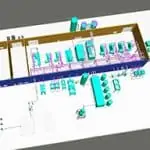
SCS is receiving the Gold Business Achievement Award for a Large Environmental Firm, for outstanding business performance in 2019. We largely attribute our organic growth to our clients interested in Sustainable Materials Management (SMM) and renewable natural gas (RNG) services. Our SMM programs increase our clients’ solid waste management efficiencies, reduce waste, and support sustainable recycling, and our design and design/build facilities convert landfill gas, dairy digester gas, and wastewater treatment plant digester gas to RNG. In addition, SCS’s Geographic & Practice Area Expansion initiative in 2019 enables us to expand our professional engineering and consulting services for liquids management, wastewater treatment, and emerging contaminants from new offices in the South, Central, and Midwest regions of the United States.
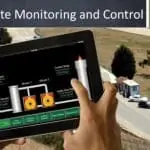
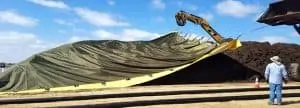
The Environmental Services Division of the city of San Diego, in collaboration with SCS Engineers, is receiving the Composting Project Merit Award in recognition for the composting operation at the Miramar Landfill in San Diego. In collaboration with the City, SCS designed an innovative covered Aerated Static Pile (ASP) composting system that will divert 100,000 tons per year of organic waste from the landfill. The ASP became operational in August 2019 and will compost 40,000 tons per year into useful by-products (and has capacity for an additional 20,000 tons). It provides an enhanced stormwater control system, and will eventually run on renewable energy generated from the landfill. According to the StopWaste.com calculator, the upgrade reduces greenhouse gas emissions by the equivalent of removing 19,015 cars from the road.
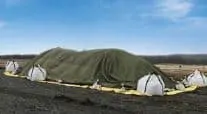
In addition, the recent announcement of SCS’s ASP Composting Pilot Program is making headlines. SCS owns a covered ASP compost system that is mobile and can be set-up on sites within an area of 50 feet by 100 feet, or less. In the covered ASP compost system, process and odor control is pro-active with a shorter composting period. Pilot tests allow waste managers to assess composting and to see if it is the right fit for their situation. The ASP system processes material batches in two months. Additional batches or “recipes” can test in 2-month intervals.
“Managing air, water, and soil pollution prevention are driving state and local regulations,” said Bob Gardner, a Senior Vice President of SCS Engineers. “Offsetting as much of the cost by improving operations, lowering energy consumption, and switching to renewable energy resources is critical to our clients.”
About SCS Engineers
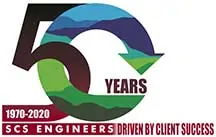 SCS, an employee-owned environmental consulting and construction firm, is celebrating our 50th year in business. We are producing technologies and programs that lower industrial operating costs and reduce greenhouse gases for private and public clients who are establishing goals to reduce their environmental impact.
SCS, an employee-owned environmental consulting and construction firm, is celebrating our 50th year in business. We are producing technologies and programs that lower industrial operating costs and reduce greenhouse gases for private and public clients who are establishing goals to reduce their environmental impact.
Our technologies and programs are finding footholds in the agricultural, industrial, and manufacturing sectors as municipalities and companies aim to reach climate change goals without passing all of the expense to consumers. SCS clients entrust us with the management of more than 35 million metric tons of anthropogenic CO2e greenhouse gases every year. We collect and beneficially use or destroy enough to offset greenhouse gas emissions from 7.4 million passenger cars annually.
Planning your RNG pipeline design requires a review of how the project might impact land use, archaeologic resources, endangered resources, floodplains, wetlands, and soil erosion. The linear nature of pipeline projects often requires permits from multiple agencies, transportation authorities, and railroads. Getting the agencies involved early and identifying review timeframes will help keep your project on track.
Betsy and Andy will present two case studies for RNG pipeline projects where multiple permitting agencies were involved. Each project presented unique challenges that required additional coordination with local, state and federal agencies as well as the Department of Transportation and railroad operator. They share the obstacles faced and how you can overcome or avoid them to keep your project on schedule.
Conference Information and Registration
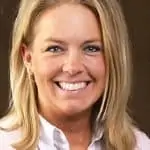
Betsy Powers, PE, is a senior project manager/civil engineer with over 20 years of consulting experience in civil and environmental engineering at SCS Engineers. She has extensive experience in the solid waste field and is currently managing the pipeline permitting and design for two RNG projects. Her experience includes design, permitting, and construction of municipal and industrial solid waste landfills, as well as recycling and composting facilities. She managed the civil site design for Wisconsin’s first utility-scale solar photovoltaic (PV) system on a closed industrial landfill.
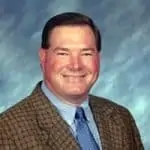
Andrew Zikeli is a senior biogas project specialist with over 8 years of biogas to renewable natural gas project experience and over 25 years of consulting experience in environmental compliance and permitting. He has extensive experience in RNG project development, plant design, permitting and commissioning, and is currently managing pipeline installation for two Wisconsin RNG projects.
Biogas, CNG, and RNG case studies , information and resources here
In August 2019, SCS Energy broke ground on construction of a 4,000-scfm landfill gas to renewable natural gas (RNG) plant in Indianapolis. Indy High Btu, LLC engaged SCS Energy to build the RNG plant under an engineer/procure/construct (EPC) agreement. Indy High Btu, LLC is jointly owned by Kinetrex Energy, Southside Landfill, and EDL Energy.
The RNG plant employs an iron redox scrubber for hydrogen sulfide removal, membranes for carbon dioxide removal and pressure swing adsorption for nitrogen removal. The plant is on schedule to achieve commercial operation in February 2020.
Kinetrex, as a major distributor of LNG, intends to convert the RNG into LNG. RNG from the plant will fuel trucks replacing nearly 8 million gallons of diesel a year. RNG is less expensive than diesel and significantly reduces the emission of methane and other greenhouse gases.
The Indy High Btu RNG plant is the third landfill gas-to-RNG plant designed by SCS to employ nitrogen removal, meeting pipeline specifications and maximizing gas recovery. Two other plants, including a 5,000-scfm project in Kentucky, which commenced operation in March 2018, and a 5,000-scfm project in Texas, which is currently under construction and scheduled to begin operations in November 2019, are both SCS Energy designs.
SCS Energy is a practice of SCS Engineers specializing in Biogas, Anaerobic Digestion, Renewable Natural Gas and Energy Systems for industrial and agricultural operations.
SCS Energy announced today the expansion of their renewable energy programs with the support of new team member Todd Stewart, PE, PMP. SCS has one of the longest and successful biogas and renewable energy practices in the United States. Stewart will support the expanding renewable energy programs for the waste industry, working out of the firm’s Pleasanton, California office.
Stewart, a Senior Project Manager, brings more than 30 years of experience managing complex solar and biogas renewable energy, anaerobic digestion, gas pipeline, and compressor station projects executed efficiently and cost-effectively for his clients and their stakeholders. His technical background in waste to energy, advanced composting systems, solar and conventional power generation, gas transmission and storage, and plant operations brings valuable skills to SCS’s clients planning to invest in the use of renewable energy to control the cost of operations and meet environmental compliance and responsibilities.
Stewart’s background spans design engineering, construction management, operations and maintenance engineering, and identifying and resolving environmental issues, and he is experienced with regulatory processes specifically CEQA and NEPA. He has demonstrated expertise in conceptual project development, FEED process, and the technical and fiscal management of large infrastructure.
“Todd has developed and coordinated some of the largest combined solar and alternative power generation projects in the world,” stated Steve Hamilton, senior vice president of SCS Energy. “We’re fortunate to be putting his acumen to work for our clients.”
Stewart is a licensed Professional Engineer in California and a Certified Project Management Professional. He is the past President of the California Society of Professional Engineers and a member of the National Society of Professional Engineers and the Project Management Institute. He earned his Bachelors of Science in Mechanical Engineering from the South Dakota School of Mines & Technology.